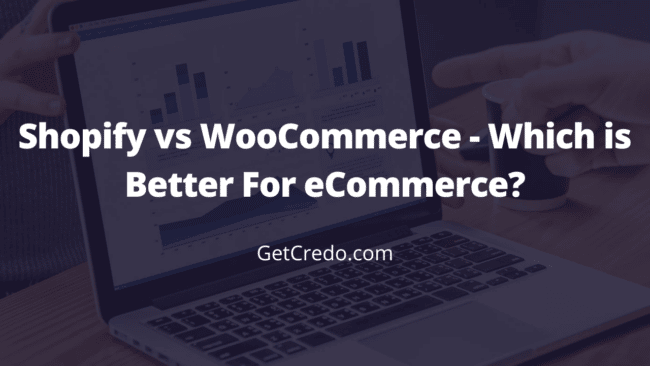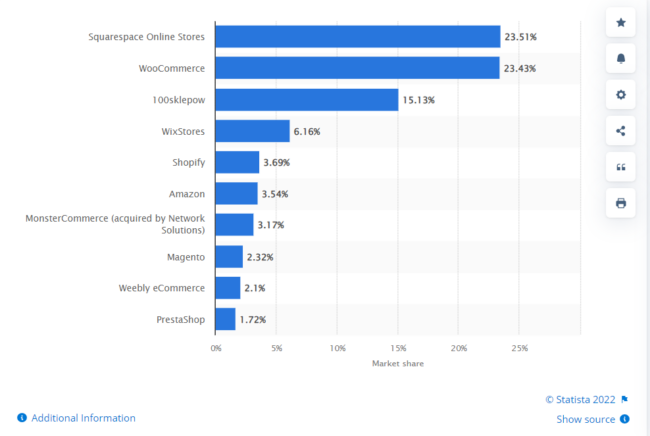
Are you looking to launch or replatform an e-commerce website? Whether it is your full-time gig or a side hustyle, you are probably asking yourself:
“Which platform should I use? Should I use Shopify or WooCommerce for my e-commerce site?
Throw in SquareSpace or Magento, and the clear leader of these three options is Shopify, then WooCommerce, then SquareSpace.
Free five step ecommerce SEO framework
Struggling to focus your ecommerce SEO efforts? Download our free ecommerce SEO framework and drive the results you need.
Table of Contents
Is Shopify good for ecommerce?
1. Shopify was created to build eCommerce sites – period. Not regular websites, only eCommerce sites. It has the plugins you’ll need to get your online shopping portal to do exactly what you need it to do.
tl;DR – Shopify is dedicated to eCommerce.
2. Shopify has developer created and supported plugins (some are free while others are an additional fee). These are all professionally built, quality apps (over 1,100 to choose from) and backed up by 24/7 support.
tl;DR – All plugins are professionally created, but that also limits it a bit.
3. Shopify has a marketplace that gives you access to hire a professional developer to work on building your website if you don’t want to do it yourself – or – if you want to build in advanced functionality that is not included in an available app.
tl;DR – Shopify has professional developers you can hire if you can’t do it yourself.
4. Shopify’s pricing plans all include an unlimited number of products you can sell. This is very different from Squarespace’s starter plan which only allows you to sell 1 product. Multiple product sales require you to choose a higher priced plan in Squarespace.
tl;DR – Shopify’s pricing includes unlimited products, but it starts higher.
5. Shopify’s SEO friendliness is superior to Squarespace. Shopify lets you edit page titles and meta descriptions for EVERY PAGE, though you also have less control if you are an advanced SEO over things like sitemaps.
tl;DR – Shopify is dedicated to eCommerce and therefore eCommerce SEO. If you are a professional SEO it may be hard to make changes sometimes though.
6. Shopify has really nice features that are associated with payment. They have abandoned cart recovery, VAT collection for European businesses, and the ability to sell in a physical location as well as your online presence with the help of some iPad/iPhone apps. With payments made using Stripe and Paypal, accepting payments has never been easier.
tl;DR – Never worry about payments with Shopify, though they do charge a percentage of sales above the Stripe fee.
7. Is Shopify better than Squarespace? In our opinion, yes. Shopify is dedicated to ecommerce and thus they build tools only for ecommerce, which means a better product.
What about WooCommerce?
WordPress and WooCommerce where, for a long time, last in our comparison but as of 2022 we must upgrade their ranking to second behind Shopify.
WordPress is the leader in powering websites on the internet, which means at this point most people online are familiar with using it.
In fact, according to our friends at Kinsta (where we host Credo, in fact), WordPress powers 43% of websites on the internet:
| % All Websites | % CMS Market | |
| WordPress | 43 | 65 |
| Joomla | 2.6 | 4.6 |
| Drupal | 1.7 | 3.0 |
| Squarespace | 1.5 | 2.7 |
| Wix | 1.3 | 2.3 |
WooCommerce, which was bought by WordPress in May 2015, has come a long way and as of the last couple of years has become a preferred store platform for those who have outgrown Shopify but do not want to pay for Shopify Plus (which costs six figures per year!).
Here is how ecommerce platform market share breaks down:

As you can see, WooCommerce actually has approximately 7x the market share of Shopify! This is because it’s build on top of WordPress.
The great thing about WooCommerce, and WordPress, is its extendability and customizability as compared to Shopify.
While you can build custom themes and use a variety of plugins with Shopify, the same is true with WooCommerce but extends even further. You can do things like custom URLs, which are not possible with Shopify, and have a plethora of options for order fulfillment and tracking as well as a variety of other things like analytics.
WooCommerce used to be extremely hard to use, but has improved over the years. Many WordPress developers also have WooCommerce development capabilities and are much easier to find that Shopify developers.
As such, WooCommerce is our second choice for building your e-commerce store!
Is Squarespace good for ecommerce?
Squarespace can also become the leader if entry cost is a huge barrier, or if ease of use is your number one priority.
1. Squarespace is much more reasonable in terms of monthly plan pricing. Squarespace does not charge any additional transaction fees, unlike Shopify which charges a percentage on top of the fee charged by Stripe to collect credit card information. But, as they say – “you get what you pay for”. Although Shopify costs more per month and per transaction, it has 24/7 available help and technical support lines. Squarespace only has live chat help between 3AM and 8PM EST and the Squarespace help line is limited on what they will and will not support. They do, however, have a hreat answers community forum.
tl;DR – Squarespace is cheaper, but more limited in terms of support.
2. Ease of use is one other area where Squarespace excels over Shopify. Squarespace has a drag and drop template for website builds. They also have custom website templates which allow you to choose a design you like and make it yours in minutes. The only problem with these easy to use features, is that you may run into trouble when trying to build in eCommerce functionality. Squarespace does have eCommerce features, but not nearly as many choices for functionality as Shopify.
tl;DR – building Squarespace sites is easier, but more limited in terms of options.
3. Squarespace has odd SEO features that are missing, such as it being difficult to edit main elements like titles for blog posts. Squarespace also has some templates that require the meta descriptions to actually display on the webpage itself, which is in most cases, not desirable. Lastly, it is important to note that SEO falls outside of Squarespace’s support line. So, if you have questions or trouble with this feature, it will be difficult to get help with it from Squarespace directly, though there are many SEO resouces available online or in forums to help you here.
tl;DR – Squarespace is more limited for eCommerce SEO than Shopify.
4. Is Squarespace better than Shopify? In our opinion, no. Shopify is dedicated ecommerce whereas Squarespace is a more general CMS. While Squarespace has kept pace fairly well for small ecommerce shops, it is not nearly as complete a solution as Shopify.
If your focus is to create a really great looking website, and just sell a few things. Squarespace would probably be a great choice. But if eCommerce is your ultimate goal, Shopify will ensure you get all the functionality you need.
Squarespace vs Shopify vs WordPress for eCommerce: Who Wins?
In order of recommendation:
- Shopify
- WordPress/WooCommerce
- Squarespace.
Free five step ecommerce SEO framework
Struggling to focus your ecommerce SEO efforts? Download our free ecommerce SEO framework and drive the results you need.
Shopify is dedicated to eCommerce, so while it is a bit more expensive than Squarespace it is tailored to your needs. Squarespace is also a fine option for dual content and eCommerce sites. WooCommerce used to rank behind Squarespace, but in recent years has overtaken them.

